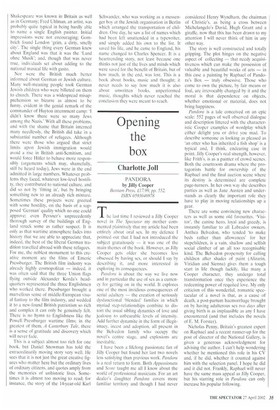Opening the box
Charlotte Joll
PANDORA by Jilly Cooper Bantam Press, £17.99, pp. 552. ISBN 0593046978 The last time I reviewed a Jilly Cooper novel in The Spectator my mother commented plaintively that my article had been entirely about oral sex. In my defence I pointed out that I had not introduced the subject gratuitously — it was one of the main themes of the book. However, as Jilly Cooper gets older she becomes less obsessed by having sex, or should I say by describing it, and more interested in exploring its consequences.
Pandora is about the way we live now and in particular the use of sex as a currency for getting on in the world. It explores one of the most invidious consequences of serial adultery — the creation of seriously dysfunctional `blended' families in which myriad step-relationships combine to distort the usual sibling dynamics of love and jealousy to unbearable levels of intensity. Add further dynamite in the form of illegitimacy, incest and adoption, all present in the Belvedon family who occupy the novel's centre stage, and explosions are inevitable.
I have been a lifelong passionate fan of Jilly Cooper but found her last two novels less satisfying than previous work. Pandora is a real return to form. Both Appassionata and Score taught me all I know about the world of professional musicians. For an art dealer's daughter Pandora covers more familiar territory and though I had never considered Henry Wyndham, the chairman of Christie's, as being a cross between Michelangelo's David, Hugh Grant and a giraffe, now that this has been drawn to my attention I will never think of him in any other way.
The story is well constructed and totally gripping. The plot hinges on the negative aspect of collecting — that needy acquisitiveness which can make the possession of valuable and beautiful works of arts — in this case a painting by Raphael of Pandora's Box — truly obsessive. Those who come to own the picture, by fair means or foul, are irrevocably changed by it and the moral is that dependence on objects, whether emotional or material, does not bring happiness.
Pandora is a tale conceived on an epic scale: 552 pages of well observed dialogue and description littered with the characteristic Cooper examples of wordplay which either delight you or drive you mad. To describe someone as looking as pleased as 'an otter who has inherited a fish shop' is a typical and, I think, endearing case in point. Jilly Cooper's real strength, however, like Frith's, is as a painter of crowd scenes. Both the courtroom drama where the protagonists battle for ownership of the Raphael and the final auction scene where its destiny is determined are complete page-turners. In her own way she describes parties as well as Jane Austen and understands as clearly the important role they have to play in moving relationships up a gear.
There are some convincing new characters as well as some old favourites. 'Visitor', the canine hero, loyal and greedy, is instantly familiar to all Labrador owners. Anthea Belvedon, who tended `to make beds rather than allowances' for her stepchildren, is a vain, shallow and selfish social climber of an all too recognisable kind. The Belvedon propensity for calling children after shades of paint (Alizarin, Viridian and Sienna) gives them a tough start in life though luckily, like many a Cooper character, they undergo total transformation once they experience the redeeming power of requited love. My only criticism of this wonderful, romantic spectacular of a novel is that, as a cause of death, a post-partum haemorrhage brought on by having adulterous sex two days after giving birth is as implausible as any I have encountered (and that includes the novels of E. M. Forster).
Nicholas Penny, Britain's greatest expert on Raphael and a recent runner-up for the post of director of the National Gallery, is given a generous acknowledgment for advising the author. I can't help wondering whether he mentioned this role in his CV and, if he did, whether it counted against him with the selection panel. I hope he did and it did not. Frankly. Raphael will never have the same mass appeal as Jilly Cooper, but his starring role in Pandora can only increase his popular following.


































































 Previous page
Previous page